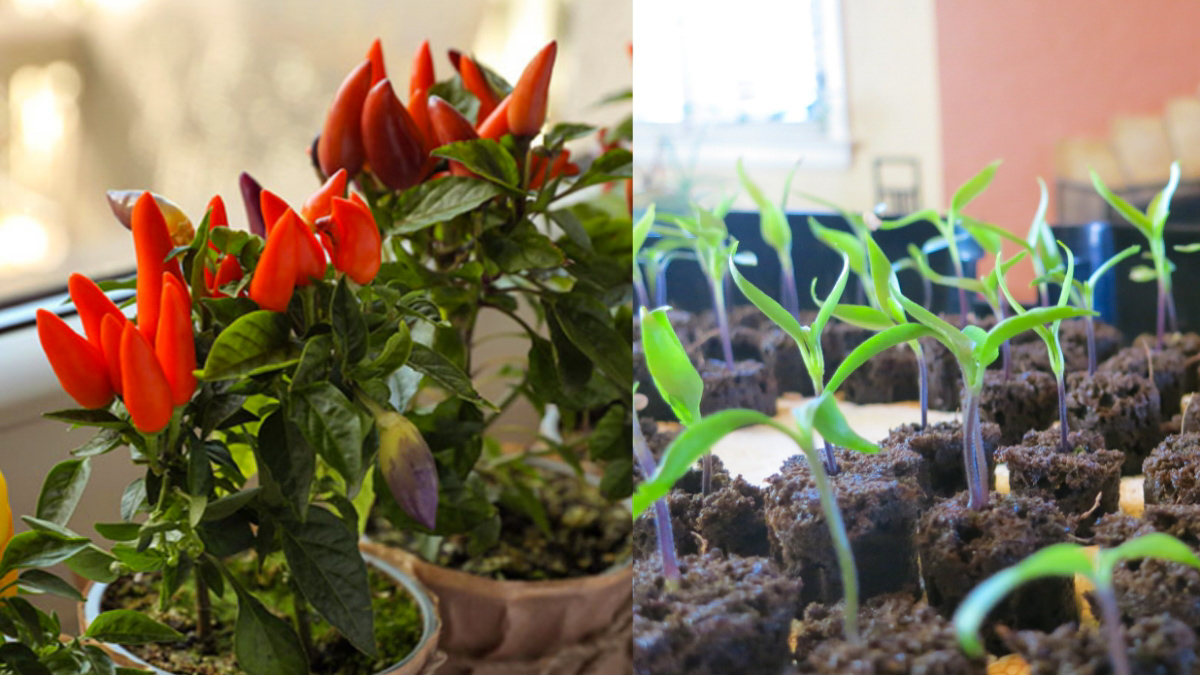Grow Peppers Indoors: Want to add a little spice to your indoor garden? Peppers are vibrant, flavorful, and surprisingly easy to grow inside your home. Whether you live in a high-rise apartment or just want to make the most of your indoor space, growing peppers indoors is a rewarding part of urban farming. In this complete guide, we’ll show you how to grow peppers indoors, from seed to harvest—no backyard required!
🌿 Why Grow Peppers Indoors?
Growing peppers indoors offers numerous benefits:
- Year-Round Harvests: No need to wait for summer—grow fresh peppers even in winter.
- Pest Control: Indoor environments reduce common garden pests.
- Space Efficiency: Perfect for apartments, balconies, or small homes.
- Control Over Environment: You manage the light, temperature, and water.
- Fresh and Organic Produce: Harvest chemical-free peppers from your kitchen window!
🫑 Best Pepper Varieties for Indoor Gardening
Not all peppers are suited for indoor growing. Here are the best compact and container-friendly varieties:
✅ Bell Peppers (Mini Varieties)
- Varieties like ‘Mini Bell’ or ‘Baby Belle’ are perfect for containers.
- Sweet and crunchy; ideal for salads and stir-fry.
✅ Chili Peppers
- Varieties like ‘Cayenne’, ‘Thai Chili’, and ‘Tabasco’ thrive indoors.
- Compact plants with prolific yields.
✅ Banana Peppers
- Mildly spicy, great for pickling and sandwiches.
- Require moderate space and good lighting.
✅ Jalapeños
- A favorite for heat lovers.
- Bushy plants that produce well in containers.
🌞 Light Requirements for Indoor Peppers
Peppers need at least 12–16 hours of bright light daily.
🔆 Natural Light:
- Place your plants near a south-facing window for maximum sun exposure.
- Rotate plants every few days for even growth.
💡 Grow Lights:
If sunlight is limited, supplement with:
- LED grow lights (full-spectrum preferred)
- Fluorescent lights (T5 tubes work well)
Tip: Use a timer to automate lighting and maintain consistency.
🪴 Choosing the Right Containers & Soil
✅ Container Size:
- At least 3-5 gallons per plant
- Drainage holes are essential
✅ Soil Type:
- Use well-draining, organic potting mix.
- Add perlite or vermiculite to improve aeration.
- Avoid garden soil—it compacts and retains too much water indoors.
💧 Watering & Humidity Needs
How to Water:
- Keep soil consistently moist, but not soggy.
- Let the top inch of soil dry out before watering again.
- Water at the base of the plant to avoid mold.
Humidity:
- Peppers prefer 40–60% humidity.
- In dry homes, use a humidifier, pebble tray, or group plants together.
🌡️ Ideal Temperature Range
- Daytime: 70–80°F (21–27°C)
- Nighttime: 60–70°F (16–21°C)
Avoid placing pepper plants near cold drafts or heating vents. Sudden temperature changes can lead to flower drop or stunted growth.
🍽️ Fertilizing Your Indoor Peppers
Feeding Schedule:
- Start feeding once plants are 4–6 weeks old.
- Use a balanced liquid fertilizer (10-10-10 or 5-10-10).
- Feed every 2–3 weeks during the growing season.
Tip:
- Switch to a low-nitrogen, high-phosphorus fertilizer when plants begin to flower to encourage fruiting.
🐞 Common Problems & Solutions
| Problem | Cause | Solution |
|---|---|---|
| Yellowing Leaves | Overwatering or nutrient deficiency | Check soil moisture and fertilize |
| Dropping Flowers | Lack of light or pollination | Use grow lights and hand-pollinate |
| Aphids or Spider Mites | Dry indoor air | Spray with neem oil or insecticidal soap |
| No Fruit Formation | Poor pollination or excess nitrogen | Hand-pollinate and reduce nitrogen feeding |
🌼 How to Pollinate Indoor Peppers
Indoors, there are no bees to help. Here’s how to do it yourself:
- Use a small paintbrush or cotton swab.
- Gently transfer pollen from one flower to another.
- Do this every few days during the flowering stage.
You can also gently shake the plant to mimic wind and encourage self-pollination.
🧺 Harvesting Your Indoor Peppers
When to Harvest:
- Bell peppers: When they reach full size and desired color
- Hot peppers: Usually 60–90 days after transplanting
- Peppers change color as they ripen—green to red, yellow, or orange
How to Harvest:
- Use sharp scissors or pruners
- Don’t pull them off—it can damage the plant
Pro Tip:
The more you harvest, the more peppers your plant will produce!
🌱 Advanced Tips for Growing Peppers Indoors
- Use a fan to simulate wind—strengthens stems and helps with pollination.
- Prune suckers (extra small branches between main stem and leaves) for better airflow and light penetration.
- Stake or support taller pepper plants to prevent leaning or breakage.
- Rotate crops and refresh soil between seasons to prevent disease buildup.
📦 Hydroponic Option for Indoor Peppers
Want to go soil-free?
Hydroponic systems like Kratky, Deep Water Culture (DWC), or Nutrient Film Technique (NFT) can be perfect for peppers indoors.
Advantages:
- Faster growth
- Less mess
- Precise nutrient control
You’ll need:
- Grow lights
- Nutrient solution
- pH testing kit
- Net pots and growing medium (like clay pebbles)
❓ FAQs About Growing Peppers Indoors
Can I grow peppers indoors year-round?
Yes! With proper lighting and temperature, you can harvest peppers all year.
How long do indoor pepper plants live?
Indoors, pepper plants can live 2–5 years if cared for well.
Do I need to prune pepper plants?
Occasional pruning improves airflow and encourages bushier growth.
Can I grow peppers in a windowsill?
Yes, if the window gets 6+ hours of sunlight daily or you supplement with grow lights.
✅ Final Thoughts: Urban Farming with Peppers
Indoor gardening isn’t just about growing plants—it’s about creating a healthy, sustainable lifestyle. By learning how to grow peppers indoors, you’re taking one powerful step toward self-sufficiency, healthy eating, and eco-friendly living—even in the heart of the city.
So grab a pot, some seeds, and get growing—your spicy indoor harvest awaits!
🔗 Related Reads:
- Indoor Gardening: Grow Lettuce Year-Round
- Hydroponic Systems for Indoor Vegetable Gardens: The Ultimate Guide
- Apartment Gardening: Grow Tomatoes Indoors

